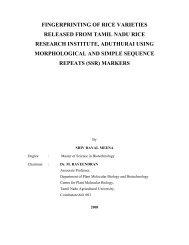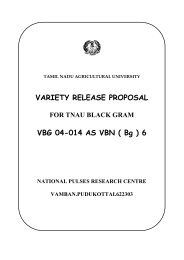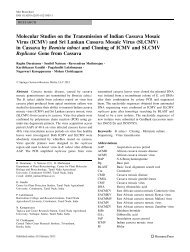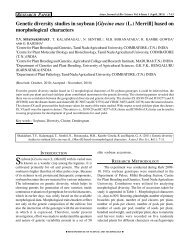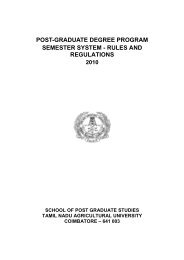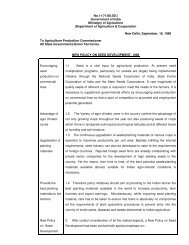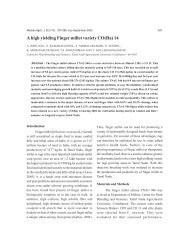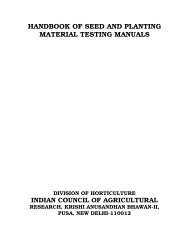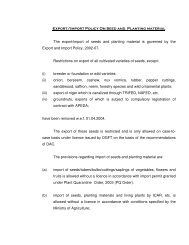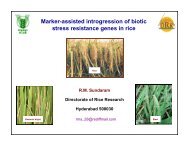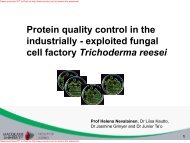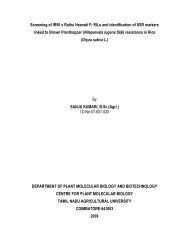MBB 601 Advances in Plant Molecular Biology 3+ ... - TNAU Genomics
MBB 601 Advances in Plant Molecular Biology 3+ ... - TNAU Genomics
MBB 601 Advances in Plant Molecular Biology 3+ ... - TNAU Genomics
Create successful ePaper yourself
Turn your PDF publications into a flip-book with our unique Google optimized e-Paper software.
<strong>MBB</strong> 603 ADVANCES IN MICROBIAL BIOTECHNOLOGY <strong>3+</strong>0ObjectiveTo discuss specialized topics about <strong>in</strong>dustrially important microorganisms.TheoryUNIT IFermentative metabolism and development of bio-process<strong>in</strong>g technology, process<strong>in</strong>g andproduction of recomb<strong>in</strong>ant products; isolation, preservation and improvement of <strong>in</strong>dustriallyimportant microorganisms.UNIT IIImmobilization of enzymes and cells; Batch, plug flow and chemo-state-cultures; Computersimulations; Fed-batch and mixed cultures; Scale-up pr<strong>in</strong>ciples; Down stream process<strong>in</strong>g etc.UNIT IIICurrent advances <strong>in</strong> production of antibiotics, vacc<strong>in</strong>es, and biocides; Steroid transformation;Bioreactors; Bioprocess eng<strong>in</strong>eer<strong>in</strong>g; Production of non-microbial orig<strong>in</strong> products by geneticallyeng<strong>in</strong>eered microorganisms.UNIT IVConcept of probiotics and applications of new tools of biotechnology for quality feed/foodproduction; Microorganisms and prote<strong>in</strong>s used <strong>in</strong> probiotics; Lactic acid bacteria as live vacc<strong>in</strong>es;Factors affect<strong>in</strong>g delignification; Bioconversion of substrates, anti-nutritional factors present <strong>in</strong>feeds; Microbial detoxification of aflatox<strong>in</strong>s; S<strong>in</strong>gle cell prote<strong>in</strong>, Bio-<strong>in</strong>secticides; Bio-fertilizers;Recent advances <strong>in</strong> microbial biotechnology.Lecture Schedule1. Microbial biotechnology: Scope and techniques.2. Fermentative diversity -Utilization of hexoses by fermentative pathways3. Fermentative diversity-Utilization of pentoses, polysaccharides and organic acid metabolisms4. Fermentation- Microbial Growth K<strong>in</strong>etics- applications of Fermentation5. Development of bioprocess technology and production of recomb<strong>in</strong>ant products6. Recomb<strong>in</strong>ant DNA products for human therapeutic use7. Recomb<strong>in</strong>ant DNA products – Challenges and future thrust8. Isolation, screen<strong>in</strong>g of <strong>in</strong>dustrially important microorganisms9. Selection and Preservation of <strong>in</strong>dustrially important microorganisms10. Stra<strong>in</strong> improvement of <strong>in</strong>dustrially important microorganisms-11. Stra<strong>in</strong> improvement- the random and empirical approach12. Case studies- stra<strong>in</strong> improvement - Recomb<strong>in</strong>ant DNA approaches for low and medium valueproducts13. Case studies- stra<strong>in</strong> improvement-Recomb<strong>in</strong>ant DNA approaches- for high value recomb<strong>in</strong>antproducts14. Pr<strong>in</strong>ciples of immobilization- techniques and importance15. Immobilization of enzymes and cells - Current trends and future Prospects16. Case studies- Immobilized cell technology – Flavour maturation of green beer17. Case studies- Immobilized cell technology alcohol free beer18. Case studies- Application of Immobilized Enzymes <strong>in</strong> pharmaceutical <strong>in</strong>dustry19. Bioreactors - types, designs and functional characteristics, computer simulations and Bioprocess5



